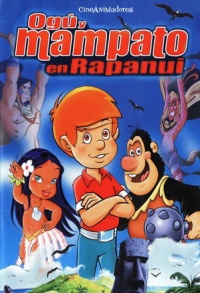Ogu and Mampato in Rapa Nui
| Ogu and Mampato in Rapa Nui | |
|---|---|

Movie poster for Ogu and Mampato in Rapa Nui
|
|
| Directed by | Alejandro Rojas |
| Written by |
Screenplay and Writer: Daniel Turkeltaub Original Comic Book: Themo Lobos |
| Starring |
Marina Huerta Maynardo Zavala Carlos del Campo Gerardo Vázquez Alondra Hidalgo Mary Paz García Mauro Samaniego Miguel Angel Ghigliazza Mario Castañeda Adrián Fogarty Benjamin Rivera |
| Music by |
Rodrigo Apablaza Emilio Manutomatoma Joe Vasconcellos |
|
Release date
|
|
|
Running time
|
80 minutes |
| Country | Chile |
| Language | Spanish |
Ogu and Mampato in Rapa Nui (Spanish: Ogú y Mampato en Rapa Nui), also known as Mampato: The Movie (Spanish: Mampato: La Película) is a feature-length Chilean animated film, created by Cine Animadores and executive produced by Elastic Studios, released June 27, 2002. Although the film isn't the first animated feature made in Chile, being the second after Alfredo Serey's 1921 film La Trasmisión del Mando Presidencial (The Transmission of Presidential Control), it is considered the country's first "modern" animated film. The movie is based on the Chilean comics character Mampato created in 1971 for the magazine of the same name by Themo Lobos and Eduardo Armstrong, and later reprinted as the comic-book Cucalón, the story for the film being adapted from the seventh adventure in the series: "Mata-ki-te-rangui".
Excited by the stories he knows about Easter Island, Mampato, a young boy with a belt device that allows time-travel, goes with his caveman friend Ogú to the ancient land of pre-columbian Rapa Nui. There they meet a little girl named Marama and discover the old traditions of the natives.
Involuntarily, the protagonists get involved in the conflicts and rivalries of the island's inhabitants, where the ariki people subjugate the Orejas Cortas, Marama's tribe.
Mampato is, with Condorito, the most popular and acclaimed comic strip from Chile. Cine Animadores, an emerging animation studio, chose Mampato to be made into the first feature-length animated film in Chilean history since the 1920s. Starting production in 1999, director Alejandro Rojas made a treatment with Themo Lobos and selected the seventh story rather than the first one, because it was based on Easter Island, a world-renowned location (with its famous Moais) best suited for a strong Latin American advertising campaign and as a means to generate non-Chilean interest.
...
Wikipedia
